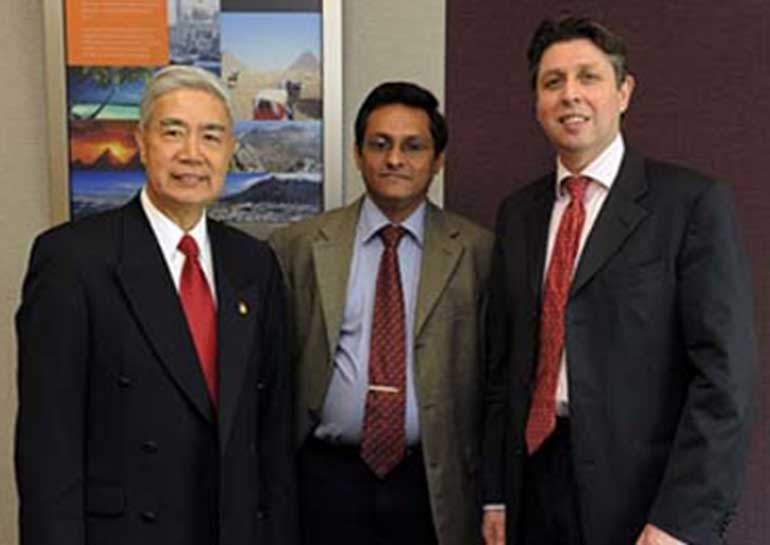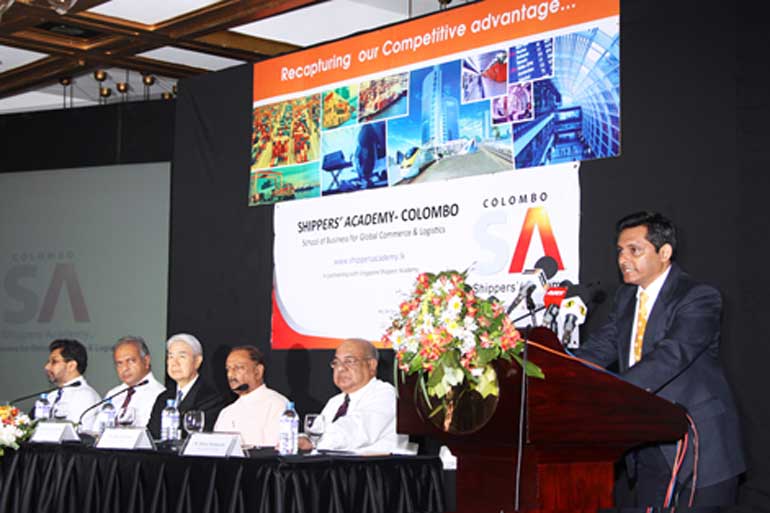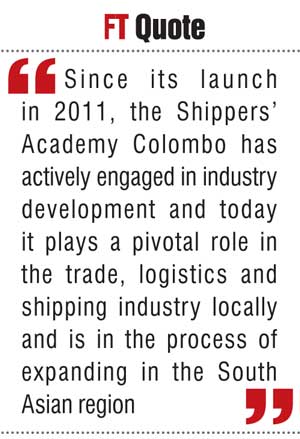Sunday Feb 22, 2026
Sunday Feb 22, 2026
Monday, 25 January 2016 00:00 - - {{hitsCtrl.values.hits}}

Immediate Past Chairman and Secretary General of the Asian Shippers’ Council John Lu and Rohan Masakorala with Secretary General of the Global Shippers’ Forum Chris Welsh at the 2010 launch of SA Singapore

The ceremonial opening of SAC 2011
 The Shippers’ Academy Colombo (SAC), known as the school of business for global commerce and logistics, completed five years of operation in Sri Lanka this month.
The Shippers’ Academy Colombo (SAC), known as the school of business for global commerce and logistics, completed five years of operation in Sri Lanka this month.
In 2010 the concept originated in Singapore where Singapore Shippers’ Academy was established with the support of International Enterprise (IE) Singapore to build the capacity and skills of Singaporeans. IE is the government agency driving Singapore’s external economy. It promotes international trade and spearheads the overseas growth of Singapore-based companies into globally competitive companies.
The Shippers’ Academy was set up to address the lack of training programs and information related to global commerce and logistics with a homegrown design to suit each country’s requirements for training and capacity building available for shippers and related communities in trade and logistics.
Since its launch in 2011, the Shippers’ Academy Colombo has actively engaged in industry development and today it plays a pivotal role in the trade, logistics and shipping industry locally and is in the process of expanding in the South Asian region.
For Asia and its shippers the implications of globalisation are far-reaching. By plugging into the global economy, Asia has been able to transcend the limits of its size. It has also managed to attract capital, enterprise and talent which are flowing to countries where governments have pursued policies to create an environment that is stable yet competitive in the shippers’ industry locally, regionally and internationally.
Realising the need for a training institute to plug the gap between conventional business schools and shipper-related programs, the Shippers’ Academy Colombo was established to uplift and enhance skills and knowledge of the global commerce environment by providing capacity-building programs for the large, medium and SME sector, where affordability and creative techniques were used as tools to plug in knowledge gaps and share knowledge.
CEO Rohan Masakorala said that we did not do capacity building in a traditional manner. “We think different to make a difference. In fact we operate with a different model than the one used in Singapore as Singapore is a mature economy. Today technology helps us a lot to deliver education and knowledge but we do customise programs. John Lu, Chairman of the Singapore National Shippers Council, helped me a lot to get the SAC up and running. It was his influence and guidance that gave us a successful start,” said Masakorala.
People involved in international trade and logistics need to be up-to-date, and SAC provides and develops short courses and workshops to uplift the industry’s knowledge and provide updates on current developments in trade and logistics related to the world and the country.
The SAC introduces the concept of mind sports and conducts two prestigious industry quiz programs, namely the Terminal Operators’ Cup (TOC) and Governor’s Challenge Trophy for Global Commerce Excellence with the support of the Central Bank of Sri Lanka (CBSL) along with the governor’s awards for global commerce excellence to recognise top performers in global commerce.
“The SAC has about 30 part-time lecturers from the trade with great experience who conduct classes and training at the Sri Lanka Foundation, BMICH, SLIDA, J.R. Jayawardena Centre and IHRA of the University of Colombo. We closely work with government institutions and partner them in training and also help develop the Government’s policy with our practical and academic knowledge input,” Masakorala added.
“The SAC would like to thank all the companies, chambers, associations, institutions, the Government, our participants and students and the media for the support extended to the SAC in many ways for the last five years to make us and our intentions a success. We also got a lot of support from international intuitions to develop our homegrown model by way of input to develop curriculum and sending speakers for forums.
“During our fifth year we launched one of our most successful products together with the support of the trade, which is the Colombo International Maritime Conference – CIMC 2015. This conference will be conducted on a continuous basis to promote and develop the maritime and logistics industry of Sri Lanka and to promote the country overseas as a shipping hub in South Asia.
The Shippers’ Academy Colombo, which is a registered entity with the Director Merchant Shipping under the Ministry of Ports and Shipping, is the very first training institution of its kind in South Asia to tailor courses for shippers and related service providers and exporters and importers who need a hybrid curriculum of shipper-centric courses. We are now in the fourth wave of globalisation and industrialisation triggered by the formation of the World Trade Organisation (WTO), which has led to greater integration amongst countries in terms of trade, transport, financial flows, ideas, information and technology. At the SAC we will keep on developing new training workshops in the coming years to serve the emerging market trends and needs,” said Masakorala.